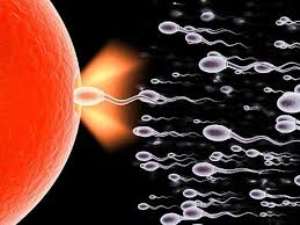
There are many things you can do to improve sperm quality and boost fertility:
Learn fertility awareness
Learning the fertility awareness method to determine your most fertile day or days as a couple each cycle, is key to enhancing your chances of conception.
Cervical fluid produced by the female partner is absolutely critical for sperm transport and survival. Timing intercourse for the day(s) that the best quality cervical fluid is produced, will give sperm their greatest chance of survival and being able to swim towards the egg (1) (2) . Timing intercourse for these peak fertile days has also been shown to minimise the effect of lowered fertility due to male age (3) .
The Fast Track to Pregnancy Program™ teaches you step by step, how to use the empowering skills of fertility awareness and fertility charting to optimise your chances of conception with low sperm count.
Don’t ‘save up’ sperm
Contrary to popular belief, in the case of low sperm count, it is NOT advisable to abstain from intercourse for extended periods, to build up sperm numbers.
While it’s true that abstaining will increase semen volume and the number of sperm, research has revealed that in men with low sperm count and quality, FREQUENT ejaculation has a significant benefit, improving sperm motility and sperm morphology, while reducing levels of DNA fragmentation. (4) (5)
In Step 3 of the Fast Track to Pregnancy Program™ , you’ll learn the ‘Ultimate Sex Timing Strategy’ which discusses in detail how to time intercourse to optimise your chances of getting pregnant with low sperm count.
Make lifestyle changes
A significant cause of male infertility is something called ‘free radical damage’. Free radicals are toxic metabolites produced by normal processes in our bodies. However, they are also produced through exposure to certain environmental factors. These highly reactive molecules damage cells, and an excess of free radicals in semen is also responsible for damaging sperm, which can lead to infertility and miscarriage.
Excess free radicals can be caused by poor diet, tobacco and alcohol consumption, illness and stress. They can also be caused by exposure to pollutants and chemicals in the environment.
Below are some tips on what you can do to fight free radical damage and improve the health of your sperm:
7 Tips to Improve Your Sperm
1. Eat a diet high in antioxidants. Antioxidants help to ‘mop up’ free radicals, reducing the amount of damage to sperm. Foods high in antioxidants include berries, fruit and vegetables (particularly those that are brightly coloured), nuts and seeds, cereals and dark chocolate.
2. Take a targeted multivitamin. If you have reduced sperm count or sperm quality, a specially formulated fertility multivitamin may help. The key vitamins and minerals that are important for healthy sperm production are: Vitamin C, Vitamin E, Zinc, Selenium, Folic Acid, L-Carnitine, CoQ10 and Glutathione.
3. Ditch the cigarettes! Smoking causes free radical damage to sperm DNA and lowers sperm quality. Men who smoke are four times as likely to have children who develop childhood cancer. Smoking marijuana is also thought to affect sperm health. Remember, it takes about 72 days for sperm to fully form, so even after you cease smoking, it may take several months for the effects to be reversed.
4. Reduce alcohol intake. Alcohol is a testicular toxin and affects sperm production and sexual function in men. Research suggests that alcohol should be limited to 5 standard drinks or less a week (one standard drink equates to a 330ml can or bottle of beer, a 100ml glass of wine or 30ml of straight spirits). Check out this blog article for more information.
5. Avoid hot baths and spas. Heat is bad for sperm production (that is why the testicles hang outside the body!). You may like to try wearing boxers instead of tight underpants.
6. Maintain a healthy BMI. Being overweight can reduce sperm count, particularly if excess fat leads to an increased temperature around the testicles. Keeping BMI within a normal range is advisable.
7. Avoid environmental toxins and pollutants. Organic solvents, pesticides, lead, toxic fumes, phthalates and other chemicals are suspected in lowering male fertility, so it is advisable to reduce exposure to these toxins where possible and wear protective clothing when necessary.




 SSNIT must be managed without gov’t interference – Austin Gamey
SSNIT must be managed without gov’t interference – Austin Gamey
 Ejisu by-election could go either way between NPP and independent candidate — Gl...
Ejisu by-election could go either way between NPP and independent candidate — Gl...
 We never asked ministers, DCEs to bring NPP apparatchiks for returning officer r...
We never asked ministers, DCEs to bring NPP apparatchiks for returning officer r...
 No one denigrated the commission when you appointed NDC sympathizers during your...
No one denigrated the commission when you appointed NDC sympathizers during your...
 Used cloth dealers protests over delayed Kumasi Central Market project
Used cloth dealers protests over delayed Kumasi Central Market project
 A/R: Kwadaso onion market traders refuse to relocate to new site
A/R: Kwadaso onion market traders refuse to relocate to new site
 Dumsor: Corn mill operators at Kaneshie market face financial crisis
Dumsor: Corn mill operators at Kaneshie market face financial crisis
 Jamestown fishermen seek support over destruction of canoes by Tuesday's heavy d...
Jamestown fishermen seek support over destruction of canoes by Tuesday's heavy d...
 Election 2024: EC to commence voter registration exercise on May 7
Election 2024: EC to commence voter registration exercise on May 7
 Public schools rebranding: We’re switching to blue and white, we’re painting all...
Public schools rebranding: We’re switching to blue and white, we’re painting all...
